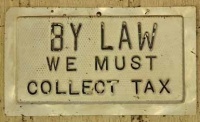 Rolling for Initiative is a weekly column by Scott Thorne, PhD, owner of Castle Perilous Games & Books in Carbondale, Illinois and instructor in marketing at Southeast Missouri State University. This week, Thorne explains popular misconceptions about online retailers and sales tax.
Rolling for Initiative is a weekly column by Scott Thorne, PhD, owner of Castle Perilous Games & Books in Carbondale, Illinois and instructor in marketing at Southeast Missouri State University. This week, Thorne explains popular misconceptions about online retailers and sales tax.Following up on last week's column about Amazon and taxes, the arguments that Amazon made in the past regarding the collection of sales taxes from online customers suffered from several misunderstandings about the nature of sales taxes. Amazon has had software in place since 2008 that calculates sales tax for all merchants using the website as a storefront from which to sell. Any issue of Direct Marketing News also advertises software that will calculate sales tax for any location in the US. Granted the software might be pricey for a smaller online retailer but Amazon itself makes collecting sales taxes nationally feasible.
A more fundamental obstacle comes from, as noted above, the general misunderstanding of the nature of sales taxes. Forty-five states, the District of Columbia and Guam all collect some form of sales tax. In those states, the sales tax provides the largest amount of funding for services offered by states and communities. The first misunderstanding comes when people, and even some stores, refer to stores "charging" sales tax. Stores do not charge sales tax, stores collect sales tax. Stores that collect sales tax have been designated by the tax collecting authority within the state with the responsibility of collecting sales tax on items sold at retail and remitting the tax collected to the state (items purchased for resale are exempt from sales tax). In some states, the store receives a percentage of the sales tax as payment for performing the collection, in other states, the total amount goes to the state treasury.
The second misconception is that because a business does not collect sales taxes, that somehow exempts the purchaser from owing the taxes. This is plain wrong. In Quill vs. North Dakota, the Supreme Court ruled that businesses "without a physical nexus" within a state were exempt from the requirement to collect sales taxes from customers within that state. That ruling did not exempt the customer from paying the sales tax to the state. This is often called a "use tax" and there is usually a line to pay the total use tax on a state's income tax form, assuming it collects one. In practice, few people pay the use tax and collecting it proves so time consuming that most states forgo chasing after it, leaving lawyers and tax attorneys the primary ones who pay it, costing the states about $23 billion per year. About a decade ago, Illinois made a concerted effort to collect unpaid use taxes and wound up spending almost as much in the attempt as it collected. The Marketplace Fairness Act, passed by the Senate but likely going nowhere in the House of Representatives, would overturn Quill and require online and mail order retailers doing over $1 million to collect and remit sales tax from all customers.
A third misconception, and this is one that was repeated by the COO of Amazon, Nathan Bennet (so he either really does not understand how sales taxes work or is deliberately ingenuous about the topic), is that online and mail order businesses should not collect sales taxes from a remote customer because the business gains no benefits from the tax. This, of course, is simply wrong since the tax is collected, not for the benefit of the business, but for the benefit of the customer. The funds generated by the sales tax are designated to fund projects in the community and state where the customer resides, not to benefit the business that collects them. The business serves as the most efficient conduit through which the sales tax money flows and, in many states, having a license to collect sales taxes is a requirement for doing business (also a requirement for opening an account with many distributors).
Of course, as I noted last week, the direction Amazon plans to take will give it physical nexus in all 50 states, requiring it to collect and remit sales taxes, like Walmart, Staples, Barnes & Noble, etc., regardless of Quill, which is why now the company supports requiring online retailers, including itself, to collect (and remit) sales taxes. Amazing how your viewpoint changes when the new vantage point benefits you.
The opinions expressed in this column are solely those of the writer, and do not necessarily reflect the views of the editorial staff of ICv2.com.







